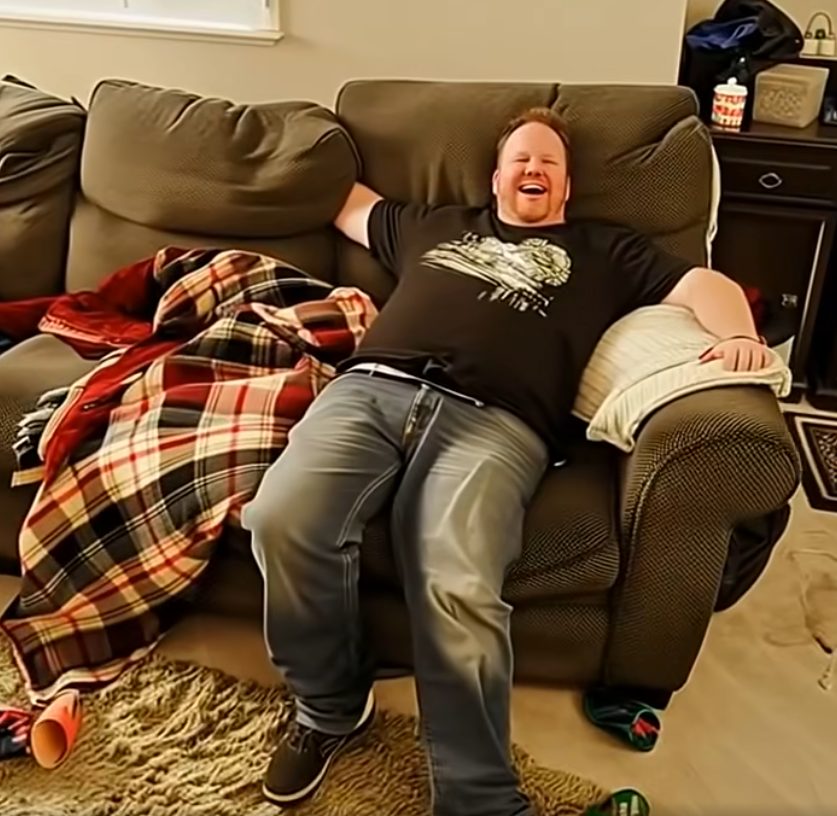My older brother, Ted (42M), has been a burden for years. He refuses to work, freeloads off my parents, drinks all day, and takes zero responsibility. He also has two kids with two different women, neither of whom he supports.
Despite this, my parents coddle him, treating him like he can do no wrong. Meanwhile, I pursued a career in biology, which they saw as a dead-end. They ignored me for years until I became successful through AI research and bought my dream house last month. Suddenly, they were all over me, insisting I let Ted move in because it was my “turn” to take care of him.
I politely refused.
But when my wife and I returned from vacation two weeks ago, I found Ted living in my house, his stuff everywhere—beer cans, dirty clothes, old furniture. He was lounging on my couch like he owned the place.
Me: “Ted… what is all this?!”
Him: “I moved in, parents helped with stuff. We just skipped your YES-part. So quit being such a jerk.”
So, I AM a jerk. Okay. I smiled broadly, creating a plan in my head, and in a week, he pleaded with me to let him leave.
It started the very next morning.
I woke Ted up at 6:00 AM by blasting classical music—Wagner’s Ride of the Valkyries—on the house speakers. He stumbled out of the guest room wearing nothing but his boxers and a stained T-shirt, hair like a porcupine, and a hangover so bad he was squinting at the sun inside the house.
Ted: “Dude, what the hell?!”
Me: “Rise and shine, big bro! Time for morning chores.”
Ted: “What chores?”
Me: “Well, see, if you’re living here, you’re contributing. New house rule. You’ll be vacuuming, taking out trash, helping with the lawn, and washing your own clothes. Plus, you’re making dinner every other night. Sound fair?”
He blinked, confused. He thought freeloading would be the same here as it was at Mom and Dad’s. But I wasn’t Mom and Dad. I was done being the “good son” who cleaned up everyone’s mess. This was my house. And this was war—polite, strategic war.
He lasted through the first day with a lot of huffing and half-done jobs. He overcooked the pasta and left a mountain of dishes. But I just smiled and said, “Great effort. Tomorrow, let’s work on seasoning and presentation.” That made him visibly shudder.
The second day, I cranked up the Wi-Fi parental controls and limited access between 9 AM and 5 PM. No internet during “working hours.” He came stomping downstairs in fury.
Ted: “Why is the internet not working?!”
Me: “Oh! I thought it’d be good for you to get out and look for a job. Or maybe do something productive. The park’s nice this time of year.”
Ted: “You’ve lost your damn mind.”
Me: “Maybe. Or maybe I’ve found my peace.”
By Day Three, I introduced him to my wife’s vegan cooking. Now, I’m not even vegan, but she had been experimenting lately, and Ted absolutely hated it. Quinoa and lentils for lunch? He nearly cried. No soda in the fridge—just sparkling water and kombucha. No processed snacks. No beer.
He tried to sneak in a case of beer late one night. I caught him and said, “Oh, did I forget to mention? This is a dry household. House rule #3.”
Ted: “You’re suffocating me.”
Me: “Not at all. You’re free to leave anytime. I won’t stop you.”
But he didn’t. Not yet.
He tried to bring a girl over on Day Four. She left ten minutes later after meeting me, my wife, and the home gym I’d set up in what used to be the rec room—now repurposed as “Ted’s new hobby zone.” I gave him a pair of resistance bands and a yoga mat. He gave me the middle finger.
On Day Five, I found him sitting on the back porch, staring blankly at the trees.
Ted: “This place is cursed.”
Me: “Nah. It’s peaceful. You’re just not used to earning your peace.”
Something shifted that day. He actually asked me a question I didn’t expect.
Ted: “How the hell did you turn out so… normal?”
That made me pause. For all the chaos he’d brought, that moment felt real.
Me: “Because I stopped expecting anyone to save me. I failed a bunch. I learned from it. I worked jobs I hated. But I kept showing up. Eventually, it paid off.”
He didn’t say anything for a while. Then he muttered, “Must be nice.”
Later that night, I saw him washing dishes—without being asked. The next morning, he made breakfast. Burnt toast and lumpy scrambled eggs, but still.
By Day Six, he was quieter. Less defiant. He even asked my wife about a soup recipe. That night, I heard him on the phone, talking to one of his kids. Not yelling. Not cursing. Just… talking.
Day Seven, he came to me with a trash bag of his stuff and said, “I think I should go. I’m not cut out for this.”
Me: “Ted, this wasn’t about cutting you out. It was about showing you what life looks like when you start owning it.”
He nodded. “I hated it at first. But I get it now. I need to clean my own mess.”
He didn’t ask for money. He didn’t play the victim. He just left with a quiet “Thanks.”
Two Months Later
I got a message from my mom, asking if I’d “finally kicked poor Teddy out.” I ignored it. But a few days later, I got a text from Ted himself:
“Working part-time at a garage. Still sucks. But I ain’t drinking. Saw my daughter last weekend. You got any vegan chili recipes?”
I smiled.
He’s still got a long road ahead. But maybe, just maybe, something clicked.
Life Lesson?
Sometimes, the best way to help someone is not by saving them—but by letting them face themselves. Not with cruelty, but with structure. Not with pity, but with purpose.
And for those who’ve ever been the “responsible one,” remember: boundaries aren’t cruelty—they’re clarity. You’re allowed to protect your peace.
If this story resonated with you, like it and share it with someone who needs to hear it.
Let’s remind each other that growth sometimes comes through the most unexpected detours.




